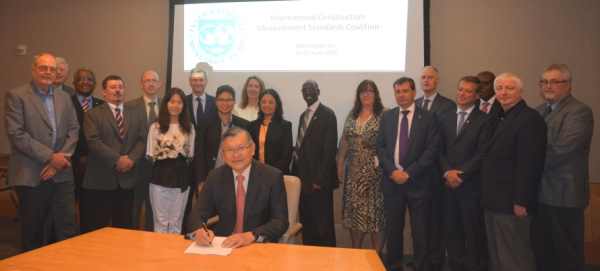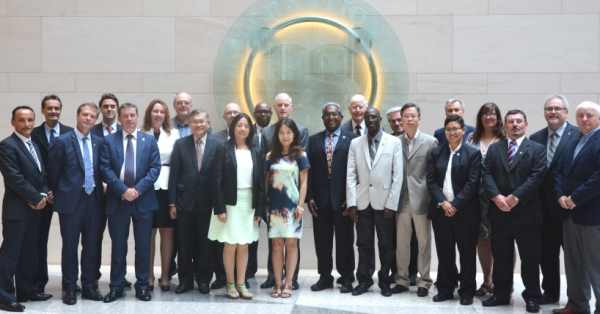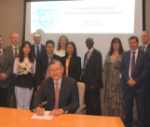News in 2015

|
Initial Meeting on International Con-struction Measurement Standard
(ICMS)
16 – 17 June 2015, Washington DC, US

Chair of FIG Commission 10 See Lian Ong signs ICMS Coalition Declaration
See Lian On, Chair of FIG Commission 10, is FIG nominee for the
Standard Setting Committee of ICMS. ICMS focuses on the
lack of global standards in construction measurement and reporting.
The meeting also included discussion on the administration of ICMS and
protocols for moving forward with the effort, such as the governance
model, standard-setting process, implementation, and communications.
On behalf of FIG, Chair of FIG Commission 10, See Lian Ong, attended
the ICMS meeting. Organisations in attendance included: AACE, ACostE, ASAQS, CECA,
CEEC, CIQS, FIG, GHIS, AAQS, HKIS, ICEC, IET, NIQS, PAQS, PICQS, RICS,
SCSI, and UNTEC. Other organisations (such as ICE, RISM, CASLE, etc)
could not attend, but sent letters expressing interest and support. The
meeting was hosted by the IMF. The majority of the meeting focused on
reviewing six discussion ‘papers’.
The papers outlined the issues and the lack of global standards in
construction measurement & reporting; the remainder of the papers focused
on the administration of ICMS and protocols for moving forward with the
effort, such as the governance model, standard-setting process,
implementation, and communications.
The discussion about Paper 1, ICMS
objectives, was particularly interesting. Some of what was mentioned on
the first day focused on raising awareness of our profession, gaining
government support and endorsement of our profession. We discussed the
challenges of monitoring construction projects, providing assurance, and
improving stakeholder decision-making. This led to potential questions
to be answered by ICMS, such as how to create standard definitions of
terminology in quantity surveying, cost engineering and construction
economics, and create a universal understanding of what is included in
reported costs of construction (such as installed materials and the
labor to install them, project management & consulting fees, and land).
It was accepted by the group that there needs to be consistency for the
purposes of construction cost benchmarking and statistics, and that ICMS
could play a significant role in achieving this.
Paper 2 deals with Governance issues and the most important thing to
note is that ICMS is the property of the Coalition members and not of
any individual organisation. There was agreement that in order for the
coalition and the project to have full legitimacy, only not-for-profit
and standards organisations should be able to join the coalition.
Extending this to commercial firms or governments would cause issues
around conflict of interest and could limit the wider appeal of ICMS in
some cases.
Paper 3 deals with the Standard Setting Process. In this respect the
Coalition will establish the Standard Setting Committee which is totally
independent and will have the full authority to develop and finalise the
standard.
Paper 4 discuss the Coalition Declaration. A number of members
reviewed the draft declaration circulated earlier and felt the need to
ensure that the Declaration consist of the objectives of ICMS. A number
of amendments was suggested and this was reflected in the Final
Declaration, a copy of which is attached in this Report.
On day two, some members of the coalition pulled the
discussion more towards standardization of SMM, and the creation by ICMS
as an overarching standard that may impact members’ SMM and government
standards, or even create the need for dual reporting. However the
meeting clarified that ICMS is not about SMM or standards of measurement
of construction activities such as elemental cost planning or bills of
quantities.
Paper 4 on Implementation was discussed. It was also noted
that the market needs to be behind implementation. Implementation should
be driven by end users of professional services and so it is essential
that we engage these stakeholders in a coordinated way. It was proposed
that we define how we target and approach end users in the marketplace.
One option is to use the online community to capture a list of the
stakeholders (e.g. architects, engineers, contractors, developers,
investors etc) and to identify which organisation will be responsible
for contacting them with details of the ICMS initiative. This could be
done on a region-by-region basis or where relationships already exist.
Paper 5 on Communication was the final discussion paper. Coalition
communications were seen as a way of promoting the initiative and
driving forward engagement. In the first instance the Coalition should
focus on recruiting further organisations, especially those in other
fields within the construction sector such as architects and engineers.
It was agreed that a generic invitation letter which could be used by
organisations to recruit other coalition members should be developed and
circulated. A communique on the establishment of ICMS will also be
developed and circulated to build momentum and interest on ICMS. Signing
of Coalition of Declaration: At the end of the meeting 17
institutions/organisations signed the final coalition declaration and
became trustees on 17 June 2015. These institutions include: AACE,
ACostE, ASAQS, CECA, CEEC, CIQS, FIG, GHIS, AAQS, ICEC, IET, NIQS, PAQS,
PICQS, RICS, SCSI, and UNTEC. See Lian Ong signed the Declaration on behalf of FIG.
Other organisations can still join the
coalition.
FIG Council has decided that the President, Chryssy Potsiou is the
nominee for FIG as Trustee in the ICMS Coalition and that Mr See Lian
Ong, Chair of FIG Commission 10 will be FIG nominee for the
Standard Setting Committee of ICMS.

Group
of the participatnts at the IMF HQ
See Lian Ong
FIG Commission 10 Chair
23
June 2015


























